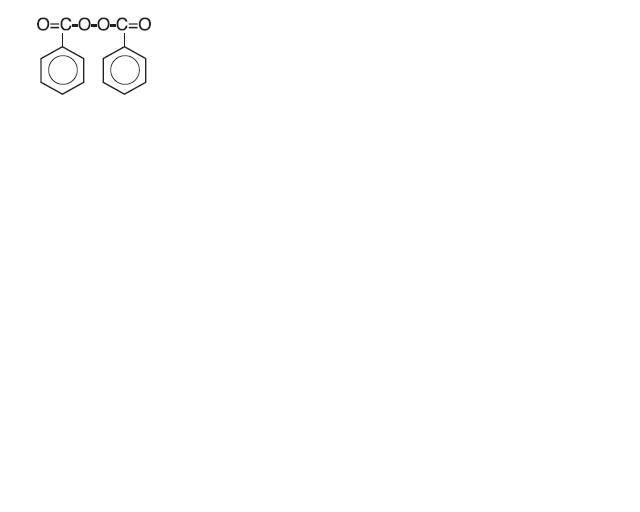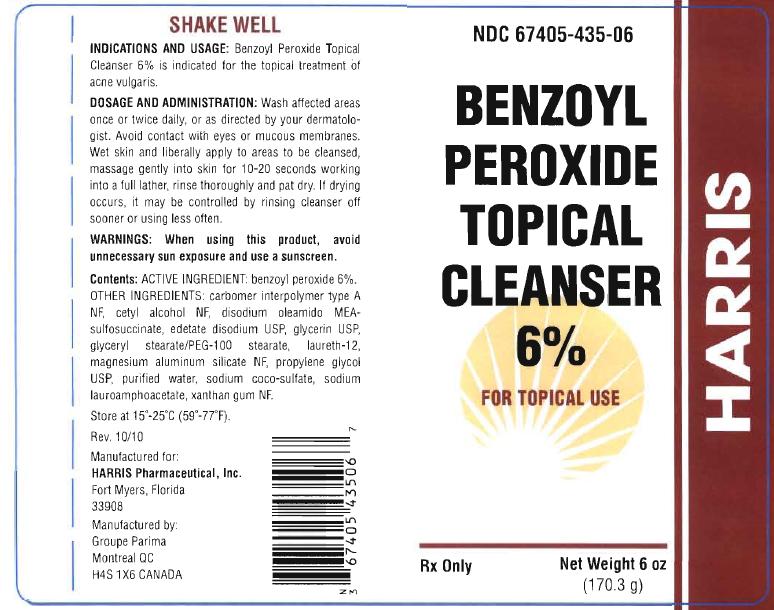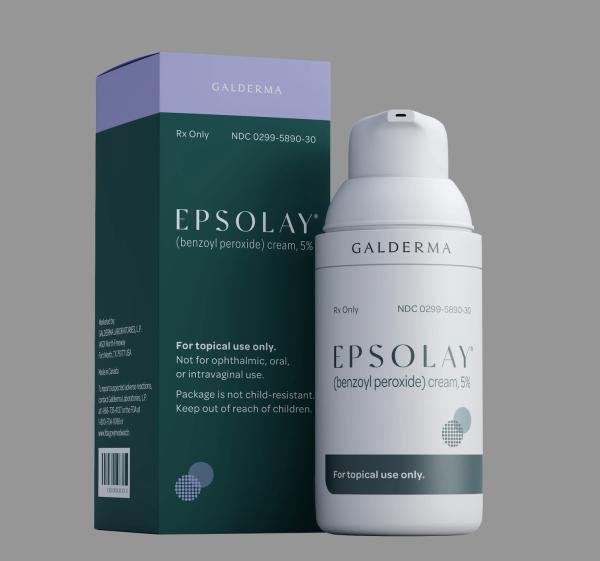Benzoyl Peroxide Soap: Package Insert / Prescribing Info
Package insert / product label
Generic name: benzoyl peroxide
Dosage form: soap
Drug class: Topical acne agents
Medically reviewed by Drugs.com. Last updated on Mar 25, 2025.
On This Page
DESCRIPTION:
Benzoyl Peroxide Topical Cleanser 6% is a topical, gel-based, benzoyl peroxide containing preparation for use in the treatment of acne vulgaris. Benzoyl peroxide is an oxidizing agent that possesses antibacterial properties and is classified as a keratolytic. Benzoyl peroxide (C14H10O4) is represented by the following chemical structure:

Benzoyl Peroxide Topical Cleanser 6% contains Benzoyl Peroxide USP 6% as the active ingredient, in a vehicle consisting of: carbomer interpolymer type A NF, cetyl alcohol NF, disodium oleamido MEA-sulfosuccinate, edetate disodium USP, glycerin USP, glyceryl stearate/PEG-100 stearate, laureth-12, magnesium aluminum silicate NF, propylene glycol USP, purified water, sodium coco-sulfate, sodium lauroamphoacetate, xanthan gum NF.
CLINICAL PHARMACOLOGY:
The mechanism of action of benzoyl peroxide is not totally understood but its antibacterial activity against Propionibacterium acnes is thought to be a major mode of action. In addition, patients treated with benzoyl peroxide show a reduction in lipids and free fatty acids, and mild desquamation (drying and peeling activity) with simultaneous reduction in comedones and acne lesions. Little is known about the percutaneous penetration, metabolism, and excretion of benzoyl peroxide, although it has been shown that benzoyl peroxide absorbed by the skin is metabolized to benzoic acid and then excreted as benzoate in the urine. There is no evidence of systemic toxicity caused by benzoyl peroxide in humans.
INDICATIONS AND USAGE:
Benzoyl Peroxide Topical Cleanser 6% is indicated for the topical treatment of acne vulgaris.
CONTRAINDICATIONS:
This preparation is contraindicated in patients with a history of hypersensitivity to any of its components.
PRECAUTIONS:
General:
For external use only. If severe irritation develops, discontinue use and institute appropriate therapy. After reaction clears, treatment may often be resumed with less frequent application. These preparations should not be used in or near the eyes or on mucous membranes.
Information for Patients:
Avoid contact with eyes, eyelids, lips and mucous membranes. If accidental contact occurs, rinse with water. Contact with any colored material (including hair and fabric) may result in bleaching or discoloration. If excessive irritation develops, discontinue use and consult your physician.
Carcinogenesis, Mutagenesis, Impairment of Fertility:
Data from several studies employing a strain of mice that are highly susceptible to developing cancer suggest that benzoyl peroxide acts as a tumor promoter. The clinical significance of these findings to humans is unknown. Benzoyl peroxide has not been found to be mutagenic (Ames Test) and there are no published data indicating it impairs fertility.
Pregnancy:
Teratogenic Effects:
Pregnancy Category C: Animal reproduction studies have not been conducted with benzoyl peroxide. It is not known whether benzoyl peroxide can cause fetal harm when administered to a pregnant woman or can effect reproduction capacity. Benzoyl peroxide should be used by a pregnant woman only if clearly needed. There are no available data on the effect of benzoyl peroxide on the later growth, development and functional maturation of the unborn child.
Nursing Mothers:
It is not known whether this drug is excreted in human milk. Because many drugs are excreted in human milk, caution should be
exercised when benzoyl peroxide is administered to a nursing woman.
ADVERSE REACTIONS:
Allergic contact dermatitis and dryness have been reported with topical benzoyl peroxide therapy.
If excessive scaling, erythema or edema occurs, the use of these preparations should be discontinued. To hasten resolution of the adverse effects, cool compresses may be used. After symptoms and signs subside, a reduced dosage schedule may be cautiously tried if the reaction is judged to be due to excessive use and not allergenicity.
Wash affected areas once or twice daily, or as directed by your dermatologist. Avoid contact with eyes or mucous membranes. Wet skin and liberally apply to areas to be cleansed, massage gently into skin for 10-20 seconds working into a full lather, rinse thoroughly and pat dry. If drying occurs, it may be controlled by rinsing cleanser off sooner or using less often.
| TOPICAL CLEANSER
benzoyl peroxide soap |
||||||||||||||||||||||||||||||||
|
||||||||||||||||||||||||||||||||
|
||||||||||||||||||||||||||||||||
|
||||||||||||||||||||||||||||||||
|
||||||||||||||||||||||||||||||||
|
||||||||||||||||||||||||||||||||
| Labeler - Harris Pharmaceutical, Inc. (617204370) |
| Registrant - Groupe PARIMA, Inc. (252437850) |
| Establishment | |||
| Name | Address | ID/FEI | Business Operations |
|---|---|---|---|
| Groupe PARIMA, Inc. | 252437850 | manufacture | |
Related/similar drugs
Frequently asked questions
More about benzoyl peroxide topical
- Check interactions
- Compare alternatives
- Pricing & coupons
- Reviews (53)
- Latest FDA alerts (3)
- Side effects
- Dosage information
- During pregnancy
- Drug class: topical acne agents
- Breastfeeding
Patient resources
Professional resources
Other brands
Epsolay, BenzePro, BPO 6 Foaming Cloths, Enzoclear Foam



